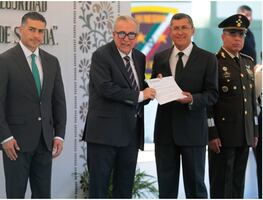Más Información

Videojuegos, el nuevo gancho del crimen para captar menores; los atraen con promesas de dinero y poder

“Vamos a dar apoyo a los pequeños agricultores por sequía en Sonora”; Claudia Sheinbaum instruye a Berdegué

Derrota de México en disputa por maíz transgénico contra EU; estos son los argumentos de Sheinbaum y AMLO para prohibirlo
The Mexican construction company Cemex has had trouble with Colombian justice since 2016 for signing a USD$13 million deal with a mining company for the purchase of land, the sale of which had been banned by the government due to a money laundering case in which the land owner was involved.
The purchase of plots in the Colombian state (department) of Antioquia
to build a cement plant next to a limestone mine, led the 39 Criminal Court of Bogotá to apply an arrest warrant on September 5 , which had been issued on June 29 of the same year against two Cemex executives and one executive member of the selling firm.
Only one of the former Cemex employees is currently behind bars. The other two are at large and fled to the United States . All three are from Colombia.
The warrant was issued against Edgar Ramírez Martínez, former vice-president of Planning, and Camilo González Téllez, former vice-president of legal affairs , as well as against Eugenio Correa Díaz, a representative from the mining company C.I. Limestone and Minerals from Colombia . Both Ramírez and Correa are now fugitives.
During a hearing before U.S. judicial authorities this year , Ramírez revealed that the Mexican multinational company was involved in a bribe network in Colombia and other Latin American countries , similar to the one fostered by the Brazilian construction company Odebrecht to win public works contracts in ten Latin American countries .
When consulted on the matter, the headquarters of Cemex in Mexico claimed that they were currently unable to comment, since they were dealing with an ongoing investigation. They also issued a press release in which they claimed that “Cemex Colombia willingly published a statement revealing the dismissal of some of their executives, including Edgar Ramírez, for irregularities found in dealings related to the purchase of land for a cement plant in Antioquia.”
The Mexican company indicated that they had presented “said findings before the Attorney General’s Office, who in turn began a criminal investigation.”
“Cemex Colombia has been cooperative with every investigation and the aforementioned authorities have not been able to prove that Cemex Colombia, its affiliates, or employees broke the law in any way ,” they added.
According to the Attorney General’s Office in Colombia, Ramírez was accused with crimes such as aggravated disloyal administration and aggravated illicit enrichment for the benefit of private institutions, whereas González was accused with disloyal administration and aggravated illicit enrichment .
Correa was accused of money laundering, illicit enrichment, and forgery of private contracts .
During their argument before the jury, the Attorney General’s Office claimed that all three of them should be incarcerated because “evidence indicates that they handled, hid, and covered for the illegal transformation of resources that originated from illegal activities.”
They argued that Cemex had made a deposit of 40 billion Colombian pesos, which is equivalent to around 13 million dollars in Correa’s personal account for the purchase of land in the Maceo municipality of Antioquia .
According to the office, the Colombian land owner José Aldemar Moncada Moncada was “sentenced for money laundering as part of a million-dollar fraud on the Colombian government through tax recoveries,” and was assassinated by hit-men on April 2016 .
dm








